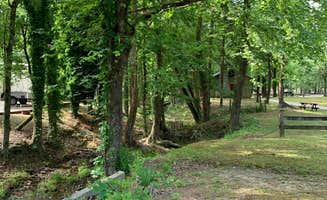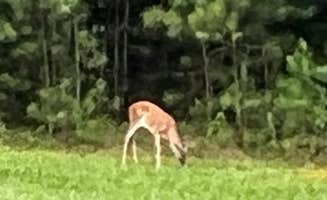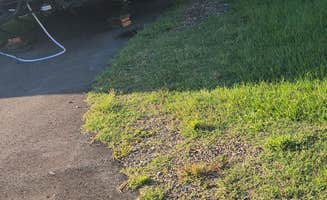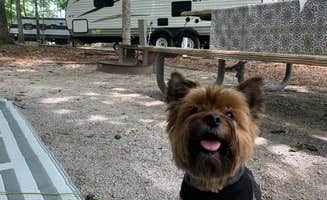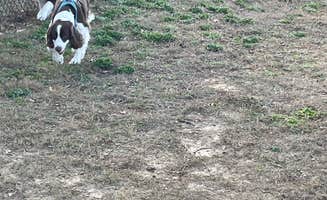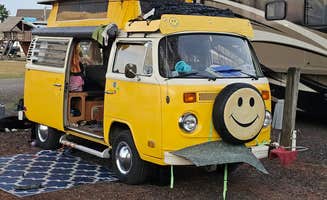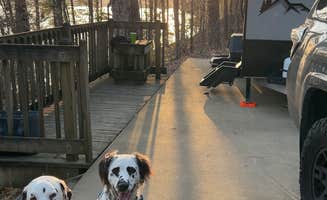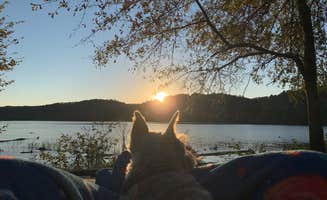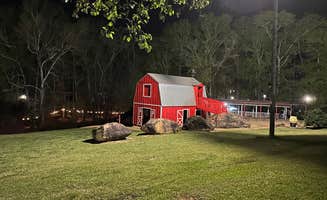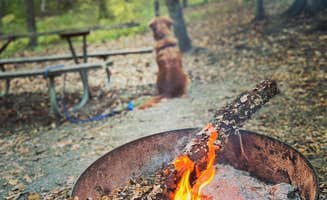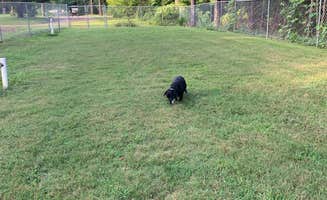Tuscaloosa National Forest surrounds the town of Brent, Alabama, creating opportunities for pet-friendly camping in diverse woodland settings. Situated approximately 40 miles from Birmingham in central Alabama, campgrounds in this region experience mild winters with occasional freezing temperatures and humid summers where highs regularly reach the upper 90s. Most campgrounds maintain open status year-round, though some primitive facilities close water service during winter months.
What to do
Swimming access at designated areas: Payne Lake West Side offers a dedicated swimming beach for cooling off during warmer months. "There is a beach area for swimming and bathhouses are large and clean. Plenty of shade and picnic areas," notes Amber B. The lake features accessible swimming areas with sandy shorelines where pets can watch from designated areas nearby.
Historical sites exploration: Tannehill Ironworks Historical State Park Campground provides educational opportunities through restored historical structures. "The park is full of historical buildings like an old mill, furnace, blacksmith shop, and restored cabins," shares Randi P. Visitors can walk self-guided tours through the ironworks facilities to learn about Alabama's industrial history.
Mountain biking on maintained trails: The trail systems offer various difficulty levels for mountain bikers, particularly at parks with dedicated cycling paths. "The Mountain Bike trails are a blast and well maintained. Definitely worth the trip for that alone," reports Adam R. about Tannehill's trail network. Most trails require standard mountain biking safety gear and close at sundown.
What campers like
Full hookup options at reasonable rates: Deerlick Creek provides quality sites with utilities at competitive prices. "Love the large sites that are nicely separated from neighboring sites and overlook the water. Friendly staff and clean bathhouse," says Steve V. Sites with water and electric typically range from $18-25 per night, while full hookups may cost $25-35 depending on location.
Privacy between campsites: Many campers appreciate the natural buffers between sites at certain campgrounds. Eric H. notes about Deerlick Creek: "Nice level concrete pads with awesome shade. Bath house stayed clean. Nice 1/2 mile asphalt bike/walking trail." The spacing between sites allows pets to relax without constant interaction with neighboring campers.
Affordable primitive camping: Payne Lake East Side offers basic accommodations at minimal cost. "Payne Lake East is primitive camping that costs $6 dollars a night. From here you can access the amenities on the west shore," explains Gregg G. These sites provide picnic tables and lantern posts with access to pit toilets, ideal for campers seeking economical options.
What you should know
Limited cell service in remote areas: Coverage varies significantly between campgrounds, with some offering reliable connectivity only for certain carriers. "Unless you have Verizon you probably won't have cell service (which is why it's not crowded) but that can be a good thing," explains Missy W. about Payne Lake. Plan communications accordingly and download maps before arrival.
Seasonal wildlife awareness: Wildlife encounters occur regularly at campgrounds near water features. Gregg G. notes at Payne Lake East: "Apparently there are alligators here, but they are seldom seen this time of year per the campground host." Spring and summer bring increased reptile activity around shorelines and marshes.
First-come, first-served policies: Several campgrounds operate without reservation systems. "We arrived late on a Thursday night and appreciated that the ranger is on-site 24/7, since the campground doesn't take reservations. The process is easy—you just pull in, find a site, and register/pay the next morning," explains Randi P. about Tannehill Ironworks.
Tips for camping with families
Children's recreation options: Birmingham South RV Park provides dedicated play facilities. "The pool was open and they had a nice play area for the kids. Nothing too fancy but great for our overnight stay," reports Beth H. The campground's proximity to Pelham offers additional family activities within a short drive.
Educational opportunities: Historical parks combine learning with outdoor recreation. "We camped at Tannehill for our 12th anniversary. It was Flea Market weekend, also. The museum there is very interesting and educational," shares Leesha J. Families can participate in scheduled demonstrations of historical crafts and industries.
Gathering firewood protocols: Rules about collecting wood vary between campgrounds. At Payne Lake West, "The host also let us know we could scavenge any fire pits or pick anything brown off the ground for a fire," says Mo F. Some facilities sell bundled firewood, while others permit gathering from downed timber within campground boundaries.
Tips from RVers
Site selection considerations: Oak Mountain State Park Campground offers varied sites requiring strategic selection. "A30 level site and nearly full shade coverage. Moveable wooden and metal picnic table. Metal fire pit with cooking grate," reports Napunani. RVers should check site dimensions before booking to ensure compatibility with their equipment.
Utility connections quality: Many campgrounds provide full hookups, but quality varies. "We paid $25 that included electric hookup, bath house with showers, water on site, and a dump station. I believe you can pay another $5 for sewage on site," notes Nicole K. about Tannehill. Most sites offer 30/50 amp electrical service, water, and sewer connections at premium sites.
Terrain and backing challenges: Some campgrounds present navigation difficulties for larger rigs. "Be sure to check your spot to make sure you can park easily- some sites are difficult for large pull trailers," advises Mikki B. about Deerlick Creek. Consider requesting pull-through sites when available if maneuvering space is limited.


